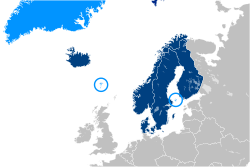This article needs additional citations for verification. (March 2020) |
The Nordic Council of Ministers is an intergovernmental forum established after the Helsinki Treaty.[1] The purpose of the Nordic Council of Ministers is to complement the Nordic Council and promote Nordic cooperation.
Nordic Council of Ministers
| |
|---|---|
|
Flag | |
 Member states shown in dark blue; and regions of member states shown in light blue. | |
| Headquarter | |
| Official languages | |
| Type | Intergovernmental organisation |
| Membership | |
| Leaders | |
• Secretary-General | |
• Presidency of the Nordic Council of Ministers | |
| Establishment | |
• Inauguration of the Nordic Council | 12 February 1953 |
| 1 July 1962 | |
• Inauguration of the Nordic Council of Ministers | July 1971 |
| Population | |
• 2018 estimate | 27,210,000 |
| Currency | |
Website norden.org | |
Structure
editThe governments of the Nordic countries each have a Minister for Nordic Cooperation.[2][3] This responsibility often goes to the Minister of Foreign Affairs or another ministerial post that the Nordic country has a special desire for cooperation. These Ministers for Nordic Cooperation delegate meetings for other Ministers to discuss avenues for cooperation in the minister's respective fields, thus the Ministers for Cooperation set up Ministerial Councils. Hence the name, Council of Ministers.
| Short Code: | Nordic Council of ministers for: |
| MR-SAM | Cooperation |
| MR-A | Labour |
| MR-VÆKST | Sustainable Growth |
| MR-FJLS | Fisheries, Aquaculture, Agriculture, Food and Forestry |
| MR-JÄM | Gender Equality |
| MR-K | Culture |
| MR-LAG | Legislative Affairs |
| MR-MK | Environment and Climate |
| MR-S | Health and Social Affairs |
| MR-U | Education and Research |
| MR-FINANS | Finance |
| MR-DIGITAL | Digitalisation 2017-2020 |
Cooperation with other International Organizations
editThe Council and the Council of Ministers are involved in various forms of cooperation with neighbouring areas, amongst them being the Baltic Assembly and the Benelux, as well as Russia and Schleswig-Holstein.[4] The Council of Ministers has offices in the following countries:
| Estonia | |
| Latvia | Riga[6] |
| Lithuania | Vilnius[7] |
Closed offices[8]
| Russia |
|
Programmes
editNordic Council of Ministers's educational programme for lifelong learning is "Nordplus". The main objective of the programme is to strengthen and develop Nordic educational cooperation.[9]
See also
editReferences
edit- ^ "The Helsinki Treaty | Nordic cooperation" (PDF). www.norden.org. Retrieved 31 March 2020.
- ^ "Ministers for Co-operation (MR-SAM) | Nordic cooperation". www.norden.org. Retrieved 31 March 2020.
- ^ Opitz, Christian; Etzold, Tobias (January 2018). "Seeking Renewed Relevance -Institutions of Nordic Cooperation in the Reform Process" (PDF). German Institute for International and Security Affairs. Retrieved 31 March 2020.
- ^ "Initiatives by the Ministers for Nordic Co-operation | Nordic cooperation". www.norden.org. Retrieved 31 March 2020.
- ^ a b c "Contact". norden.ee. Retrieved 14 May 2020.
- ^ "Homepage". Ziemeļu Ministru padomes birojs Latvijā. Retrieved 14 May 2020.
- ^ "About us". Šiaurės ministrų tarybos biuras Lietuvoje. Retrieved 14 May 2020.
- ^ "Nordic countries close offices in Russia". Barentsobserver. Retrieved 14 May 2020.
- ^ "Nordplus". Nordplus. Retrieved 7 April 2021.
